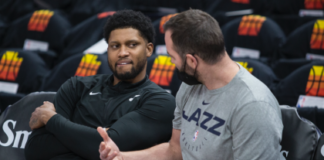Atlanta – If LGBTQ athletes at the Tokyo Olympics were their own country, they would have been in the top 10 on the medal table.
Around 180 athletes at the event were openly LGBTQ, making it the queerest modern Olympics to date. The hypothetical team finished the Olympics ranked seventh in the world with 32 total medals.
The Tokyo Games also saw another major milestone for the LGBTQ community, with Laurel Hubbard becoming the first transgender woman to compete in an Olympics and nonbinary, trans Canadian soccer player Quinn winning a gold medal in the women’s soccer competition.
Hubbard’s participation at Tokyo 2020 was a flashpoint for many around the world, but despite the controversies surrounding her, she told reporters that she was just grateful to be able to compete on the highest stage in her sport. She did not win a medal and nor did she successfully complete a lift in the 87-kg weightlifting competition, but she said that she hoped her journey would show younger athletes “it gets better.”
“I suppose the thing I have been so grateful here in Tokyo is just being given those opportunities to just go through life as any other athlete,” Hubbard told reporters.
Openly gay British diver Tom Daley won his first Olympic gold medal in Tokyo, having competed in the last four Summer Games. He took time after winning to support fellow LGBTQ athletes, telling them he hoped his victory helped them “feel less alone, like they are valued and they can achieve something.”
He also took the time to remind the world that acceptance of LGBTQ people in sports has a “lot further to go.”
“I mean, there are 10 countries that are competing at these Olympic Games where being LGBT is punishable by death,” Daley said.


The surge in interest and support for LGBTQ athletes can be seen at Pride House, the first permanent dedicated LGBTQ-centered space in Tokyo, which opened ahead of the Olympics. Originally, Pride House Tokyo was to be a temporary venue during the 2019 Rugby World Cup and Tokyo Games, with an eye to reopening after the latter event left town. Instead, because of the pandemic, Pride House Tokyo opened permanently in October 2020.
Opening Pride House and pushing the Diet to adopt a national nondiscrimination law were the two major efforts made by activists and the LGBTQ community to push for greater acceptance before the world’s focus turned to Tokyo for the Olympics.
However, during the last Diet session, conservative lawmakers in the ruling Liberal Democratic Party successfully blocked the legislation from passing.
And despite a growing number of LGBTQ athletes competing for other nations, the host country doesn’t have any out Olympians.
Strides made
Despite a lack of such Olympians, it’s not as if the country is lacking LGBTQ athletes — in recent years, several athletes have come out publicly. For example, soccer player Shiho Shimoyamada came out as lesbian in 2019 while playing in Germany. At the time, she said she would not have done so if she was playing in Japan, but she has since moved back to her home country to play.
Shimoyamada was not alone. Soon she was joined by rugby player Airi Murakami, who came out as gay this March, and most recently by soccer player Kumi Yokoyama, who came out as a transgender man in a YouTube video made with former teammate Yuki Nagasato in June.


Still, the number of Japanese athletes who have come out pales in comparison to the situation in other developed countries.
“The sports arena in Japan is still a male-dominated culture — that’s why there are so few out athletes,” said Gon Matsunaka, founder and president of Pride House Tokyo. “Coming out is a choice; we cannot push it on athletes. What we should do is not hope for a change of athletes’ minds, but to change society.”
Societal change requires that LGBTQ groups continue pushing for visibility in Japan, while also convincing lawmakers to pass laws that protect the community, Matsunaka said. During the Olympics, Pride House hosted daily events that connected LGBTQ activists, athletes from around the world and the general public to help bridge divides.
The Olympics may have been closed to spectators but Pride House was and remains open with COVID-19 guidelines in place.
“Pride House Tokyo will contribute to making sports where athletes can feel safe and comfortable by delivering messages to LGBTQ+ people, especially the young generations,” he said.
Other international organizations have joined forces with Pride House to leverage the attention from the Olympics to make this happen in Japan. Pride House teamed up with U.S. based organizations Athlete Ally and GLAAD to develop a media guide to help domestic and international media cover LGBTQ athletes appropriately.


Joanna Hoffman, communications director at Athlete Ally, said the organization “is proud to fight alongside J-ALL, a coalition of 100+ LGBT organizations in Japan” and other international organizations to push for the passage of an equality law, adding that it will continue to do so after the Tokyo Games.
LGBTQ athletes getting a chance to shine at these Games is “a beacon for others who haven’t yet come out, or who are unsure if they can be their full self and play the sport they love,” she said. This includes the LGBTQ community in Japan, despite the lack of a homegrown athlete to root for.
The more LGBTQ Olympians take center stage, the more that sports can become inclusive of all demographics, she added.
Even with this inclusivity, the ugly side of visibility was apparent at points during the Games. Plenty of ink has been spilled about both Hubbard and Quinn participating in their respective competitions, and political leaders have seized on the backlash to try and ban transgender children from playing on teams that align with their identity in countries such as the United States, Hoffman said.
“There is still a tremendous amount of myths and misinformation swirling around transgender athletes, who we know participate in sports for the same reason as any other athletes — for the love of the sport, the love of their teammates, and the invaluable lessons on teamwork and discipline that they carry with them for the rest of their lives,” she added.
“Progress on a global scale at the highest level of sport is monumental, but we also need to see progress on school playing fields (where politicians) have decided that transgender youth aren’t allowed to play sports with their friends.”
In a time of both misinformation and too much information, quality journalism is more crucial than ever.
By subscribing, you can help us get the story right.







